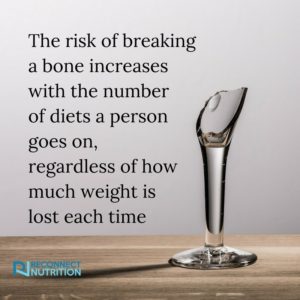
Osteoporosis occurs when bone strength is lost, increasing the likelihood of a break. Around 1 million Australians have osteoporosis with 50+ year old women most likely to be affected.
Bone strength peaks before 30 years old and gradually decreases every year after. Smoking, certain medications, genes, diet, and physically activity can all affect bone strength. In this post I’m going to talk about a risk factor that is often overlooked – the effect of dieting on bone health.
What does dieting have to do with osteoporosis?
Research looking at the effect of weight loss on bone health varies a lot. Different studies:
- use different methods of producing weight loss (diet, exercise, or both)
- study different individuals (older vs younger, men vs women)
- run for different lengths of time (months to years)
- measure the effect on different bones (hip, wrist, spine)
Grouping similar studies together and looking at the overall effect is a useful way of working out what’s really going on. A study which did this found that weight loss caused by dieting for 0.5-2 years reduced hip bone strength. Hormones that contribute to the loss of bone strength were also raised. While the decreases weren’t large they were enough to produce a small (10-15%) increase in the risk of breaking a hip.
If the risk increase is small then why does it matter?
Maintaining weight loss is incredibly difficult. Losing weight triggers hormonal changes that promote weight regain. The behaviours used to lose weight can also be hard to maintain. More often than not most of the weight lost is slowly (or rapidly!) regained. This process of weight loss and regain is known as weight cycling and it’s responsible for the increased risk.
The risk of breaking a bone increases with the number of diets a person goes on, regardless of how much weight is lost each time:
- Men who have been on 4+ diets are twice as likely to break their forearm than men who haven’t dieted
- Women who weight cycle a lot (>11 times) are almost twice as likely to break a bone than those who don’t diet
- Men and women with larger weight changes while middle aged are more than twice as likely to fracture a hip
It’s clear that people who diet more often are more likely to break a bone. However, the exact reason why is yet to be determined.
What happens to bones during weight cycling?
Looking at what happens during weight loss and regain provides some clues to link between dieting and osteoporosis.
When weight is lost levels of hormones that contribute to the breakdown of bone increase. As a result bones become weaker. As weight is regained these hormones remain high stopping bones from regaining strength. This effect can continue up to one-year after weight is lost. Beyond that it’s less clear what happens.
Bone strength doesn’t return as quickly as the weight often does. A person can find themselves back to their pre-diet weight with weaker bones than when they started. This has been observed in both pre-menopausal and post-menopausal women. It happens whether the weight regain was intentional or not. Sorry men and gender-diverse folx, no studies looking at you (yet!).
Menopause is a critical time for bone health for women and trans/non-binary folx who menstruate. Changes in hormones increase the rate at which bone strength is lost. Naturally occurring changes in body weight and shape during menopause can promote body dissatisfaction. As a result the urge to diet often increases. Dieting during or after menopause increases the risk of a break which could reduce mobility, independence and quality of life.
What can you do to support healthy bones?
People who diet often feel stuck. They’re trapped between the desire to lose weight and the reality that maintaining weight loss is difficult! Stopping weight cycling is important and not just for bone health. Breaking the diet cycle can improve overall physical and mental health too.
How can you go about this? Start by gently shifting the focus from weight loss to health promoting behaviours. From ‘trying whatever it takes to get to lose weight’ to thinking about how you would choose to take care of your body if you weren’t actively trying to change it.
If you’ve been dieting increasing food variety can help you get more of the nutrients required for building and maintaining strong bones.
Exploring types of movement that you enjoy and can stick with exerts force on your bones which helps to keep them strong.
If you’re currently smoking consider if now is a good time to reduce or stop your habit.
If you’re concerned about your risk of osteoporosis, it’s best to speak to a health professional for individualised advice.
~ Tom